In the realm of rattan furniture care, choosing the right oil can make a significant difference in maintaining its longevity and luster. In this exploration, we unveil the top 5 best oil for rattan furniture, each promising to enhance its natural beauty and ensure lasting durability.
Let’s delve into the world of rattan care and discover the products that stand out as the finest choices for preserving and revitalizing your beloved furniture pieces.
Contents
1. Best Oil for Rattan Furniture
1.1 Boiled Linseed Oil
Boiled linseed oil is a best choice for treating rattan furniture. Derived from flaxseed, this natural oil offers several benefits in preserving and enhancing the beauty of rattan pieces.
Linseed oil for rattan furniture has excellent penetrating properties, seeping deep into the rattan fibers. This penetration helps nourish the material from within, providing enhanced protection against drying and brittleness.
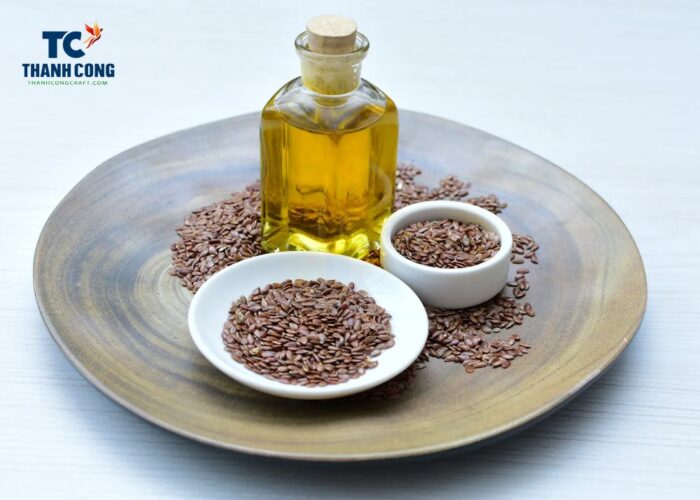
Applying boiled linseed oil brings out the natural tones and patterns of rattan, giving it a warm and rich appearance. The oil acts as a natural finish, enhancing the aesthetic appeal of the furniture.
Boiled linseed oil creates a protective barrier, helping to repel moisture and safeguard the furniture from environmental elements. It can be easily brushed or wiped onto the rattan surface, allowing for even coverage. After application, the oil is left to absorb, and any excess can be wiped away.
Boiled linseed oil has a reasonable drying time, allowing it to be absorbed into the rattan without leaving a sticky residue. This makes the application process efficient and convenient. Regular use of boiled linseed oil helps maintain the flexibility and durability of rattan furniture.
Steps
- Clean the Rattan Furniture: Before starting the boiled linseed oil application process, ensure that the rattan surface is cleaned of dust and old oil (if any) by wiping or gentle brushing.
- Apply Boiled Linseed Oil: Using a brush, cloth, or applicator, apply a layer of boiled linseed oil to the rattan surface. Ensure even coverage, extending the oil layer to every part of the furniture.
- Absorption and Cleaning: Allow the boiled linseed oil to be absorbed, letting the rattan dry naturally for a period. Afterward, you can gently wipe the surface to remove any excess oil.
- Repeat as Needed: If necessary, the above process can be repeated to ensure ongoing protection and to keep rattan furniture in optimal condition. Using boiled linseed oil is an effective way to preserve and rejuvenate rattan furniture, helping it maintain its natural beauty and durability over time.
2. Other Best Oil for Rattan Furniture
2.1 Lemon Oil
Lemon oil, derived from the peel of fresh lemons, brings several advantages to the care and maintenance of rattan furniture. Applying lemon oil to rattan furniture not only enhances its appearance but also imparts a fresh and uplifting scent to the surroundings.
With inherent antibacterial and antiviral properties, lemon oil serves as a natural cleaning agent. It can effectively cleanse rattan surfaces, eliminating bacteria and leaving behind a subtle, clean fragrance, helping to prevent rattan from drying out and becoming brittle.
Regular application can contribute to the preservation of the rattan’s natural luster and flexibility. Lemon oil has natural insect-repellent qualities. When applied to rattan furniture, it can act as a deterrent against pests, keeping them at bay without the need for harsh chemicals.
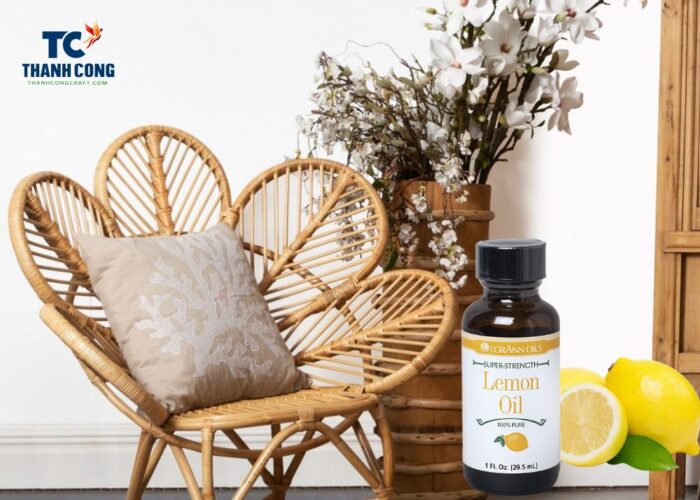
Steps
Ensure you have lemon essential oil, a carrier oil (such as coconut or jojoba oil), a soft cloth, and a bowl for mixing. Dilute a few drops of lemon oil with a carrier oil in a bowl. This step is crucial to prevent the concentrated lemon oil from being too harsh on the rattan.
Before applying the mixture to the entire rattan piece, test it in a small, inconspicuous area to check for any adverse reactions. Wipe down the rattan furniture using a dry cloth to remove any loose dust or debris. For a more thorough cleaning, you can use a slightly damp cloth.
Dip a soft cloth into the diluted lemon oil mixture and gently rub it onto the rattan. Ensure even coverage, paying attention to intricate details. Allow the lemon oil mixture to sit on the rattan for a few minutes, allowing the oil to penetrate the fibers.
Use a clean, dry cloth to buff the rattan, removing any excess oil. This step enhances the shine and prevents the furniture from feeling sticky. Once the rattan has dried and the scent has dissipated, enjoy the refreshed and subtly scented appearance of your rattan furniture.
2.2 Orange Oil
With inherent antibacterial properties, orange oil serves as an effective natural cleaning agent. It can help eliminate germs and dirt, leaving your rattan furniture both clean and fragrant. Orange oil for rattan furniture acts as a natural conditioner for rattan, helping to prevent it from drying out and maintaining its flexibility. Regular use can revitalize the appearance of the furniture.
The citrusy scent of orange oil can act as a deterrent against insects, helping to protect your rattan furniture from potential pests. Similar to lemon oil, orange oil is known for its mood-enhancing qualities. The uplifting scent can contribute to a positive and energized ambiance in your home.
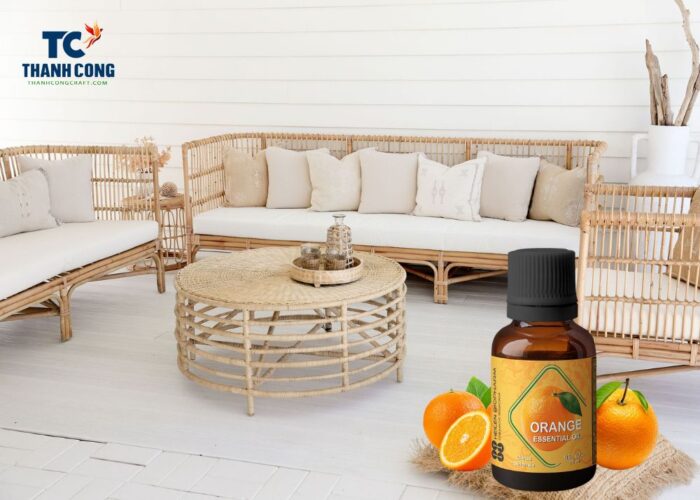
Steps
Collect orange essential oil, a carrier oil (such as jojoba or olive oil), a soft cloth, and a bowl for mixing. Dilute a few drops of orange oil with a carrier oil in a bowl. This ensures that the oil is not too concentrated for application on rattan.
Before applying the mixture to the entire rattan piece, conduct a patch test in a small, inconspicuous area to check for any adverse reactions. Wipe down the rattan furniture using a dry cloth to remove loose dust or debris. For a more thorough cleaning, you can use a slightly damp cloth. Dip a soft cloth into the diluted orange oil mixture and gently rub it onto the rattan. Ensure even coverage, paying attention to intricate details and surfaces.
Allow the orange oil mixture to sit on the rattan for a few minutes, allowing the oil to penetrate the fibers. Use a clean, dry cloth to buff the rattan, removing any excess oil. This step enhances the shine and prevents the furniture from feeling sticky.
Ensure proper ventilation if you’ve used a significant amount of orange oil, allowing the fresh citrus scent to dissipate. Once the rattan has dried and the scent has dissipated, enjoy the refreshed appearance and subtle citrus fragrance of your rattan furniture.
2.3 Tung Oil
Tung oil is also one of the best oil for rattan furniture, known for providing a natural and transparent finish. It creates a protective layer on the surface of your rattan furniture, making it resistant to water.
This property helps prevent damage caused by exposure to moisture, making it suitable for both indoor and outdoor rattan furniture.
It can be brushed or wiped onto rattan surfaces, and its penetration into the material ensures effective coverage.
When applied to rattan furniture, it enhances the natural beauty of the material, adding depth and richness.
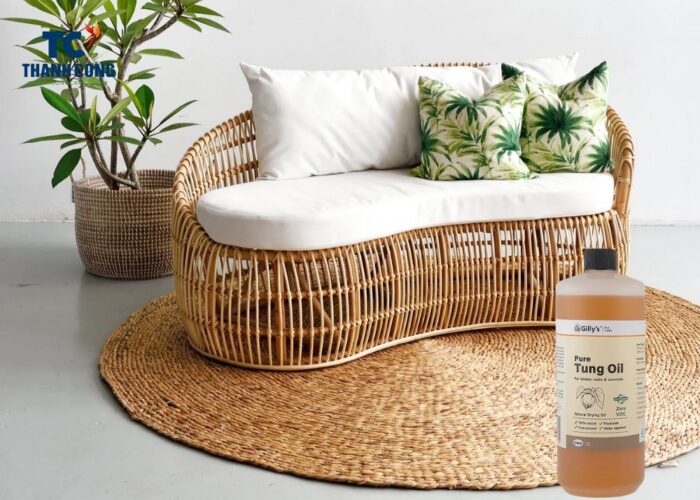
Steps
Collect tung oil, a clean cloth or brush for application, and a container for mixing if needed. Ensure that the rattan furniture is clean and free of dust or debris. Wipe it down with a dry cloth or use a slightly damp cloth for a more thorough cleaning.
Depending on the specific product, tung oil may be used as is or diluted with a solvent. Follow the manufacturer’s instructions regarding dilution ratios if applicable. Using a brush or a clean cloth, apply a thin and even coat of tung oil to the rattan surface. Ensure that the oil penetrates the material. Pay attention to intricate details and hard-to-reach areas.
Allow the tung oil to absorb into the rattan for about 15-20 minutes. This absorption period allows the oil to penetrate the fibers and enhance the wood. After the absorption period, use a clean, dry cloth to wipe off any excess oil.
Depending on the desired level of protection and the condition of the rattan, you can repeat the application process for additional coats. Allow each coat to fully dry before applying the next. Let the rattan furniture cure and dry completely. This may take several days, and proper ventilation is essential during this time.
2.4 Olive Oil
Olive oil serves as a natural conditioner for rattan furniture. When applied, it helps prevent the material from drying out and maintains its flexibility, contributing to the overall longevity of the furniture. The application of olive oil can enhance the luster and natural beauty of rattan. It adds a subtle sheen to the furniture, highlighting its unique patterns and textures.
Olive oil is a non-toxic and eco-friendly option for rattan maintenance. It doesn’t contain harmful chemicals, making it a safe choice for both indoor and outdoor furniture. Its availability and affordability make it a convenient choice for those looking for a simple and natural rattan treatment.
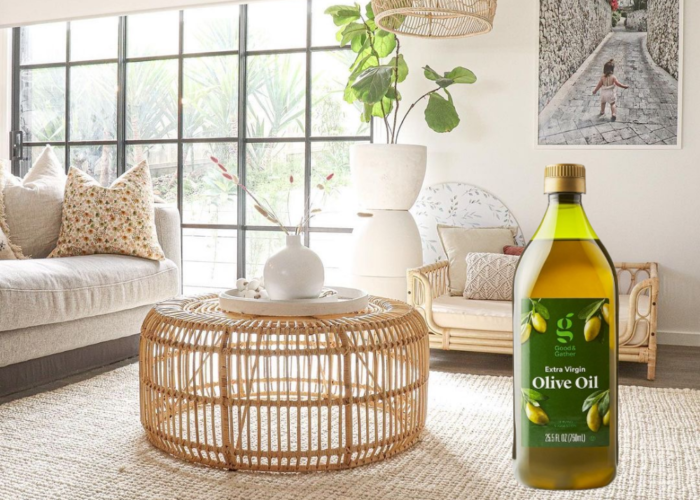
Steps
Collect extra virgin olive oil, a soft cloth, and a clean container for mixing if desired. Ensure that the rattan furniture is clean and free of dust or debris. Wipe it down with a dry cloth or use a slightly damp cloth for a more thorough cleaning.
Optionally, you can heat the olive oil slightly to enhance its absorption. Warm the oil in a microwave-safe container for a few seconds, being careful not to overheat. Dip a soft cloth into the olive oil or the warmed oil and apply it evenly to the rattan surfaces. Ensure thorough coverage, especially in areas prone to drying or cracking.
Allow the olive oil to sit on the rattan for at least 15-20 minutes. This gives the oil time to be absorbed and work its conditioning magic. After the absorption period, use a clean, dry cloth to wipe off any excess oil. This step helps prevent a sticky or oily residue on the furniture.
Depending on the condition of the rattan and your preferences, you can repeat the application process for additional coats. Allow each coat to fully dry before applying the next.
Let the rattan furniture cure and dry completely. This may take some time, and proper ventilation is essential during this period.Once the olive oil has fully cured, you can enjoy the revitalized appearance and conditioned feel of your rattan furniture.
Summary
Oils are the indispensable product to protect and beautify rattan furniture. There are many different types of oil on the market today, but we have selected the top best oil for rattan furniture, including: linseed oil, lemon oil, orange oil, Olive oil, Tung oil.
Each type of oil has its own advantages and disadvantages, depending on your needs and preferences, you can choose the appropriate oil. We hope this article will help you gain more knowledge and experience to take care of your rattan furniture.
If you have any further questions, don’t hesitate to send thanhcongcraft an email us at [email protected] or message us at WhatsApp: +84967485411. Hope to serve you soon! Best regard!


